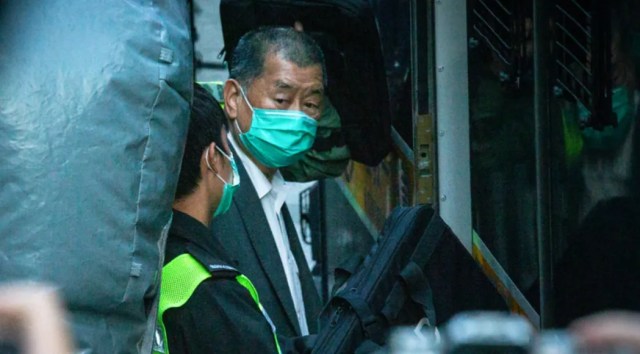Hong Kong court rejects media mogul Jimmy Lai’s challenge against decision to bar British lawyer from trial
Hong Kong Free Press

A Hong Kong court has rejected media mogul Jimmy Lai’s challenge against a national security committee’s decision to bar a British lawyer from taking part in his ongoing security trial.

Three Court of Appeal judges on Tuesday refused to grant permission for Lai to appeal against the decision of the Committee for Safeguarding National Security.
The committee was empowered to make a decision barring the mogul’s lawyer, King’s Counsel Timothy Owen, from representing him at his national security trial, after Beijing issued its first-ever interpretation of the security law at Hong Kong’s request.
The city requested the interpretation after the top court ruled in favour of Lai by deciding that Owen could represent him in his trial.
Judge Susan Kwan said on Tuesday the court was “all bound up and tied” by Beijing’s interpretation of the security law, which granted the city’s national security committee the power to vet overseas lawyers in participating in national security cases, according to The Witness. The committee is led by Chief Executive John Lee.
Lai, 76, is standing trial on two counts of conspiring to collude with foreign forces under the Beijing-imposed national security law and one count of conspiring to publish “seditious” materials. He has pleaded not guilty to all three charges and could be sentenced to life behind bars if convicted.
Overseas lawyers
Owen, Lai’s first choice of legal representative, was permitted by the High Court to represent Lai in October 2022. That decision was upheld by the Court of Appeal and the Court of Final Appeal.
But it was overturned by Beijing in December that year, after the Standing Committee of the National People’s Congress (NPCSC) issued the first interpretation of the security law. The interpretation specified that overseas lawyers must be approved by the national security committee to take part in national security cases.

Following that, the national security committee decided in January last year that Owen’s representation of Lai would harm national security, and advised the director of immigration to deny visa applications from Owen for the case.
Representing Lai on Tuesday, Senior Counsel Philip Dykes argued that residents should be allowed to challenge the government’s decision via judicial reviews. Dykes said this was a constitutional right that was also upheld by the security law.
Lai did not appear at the proceedings as his trial is taking place simultaneously at the West Kowloon Law Courts Building.
Former secretary for justice and Senior Counsel Rimsky Yuen, representing the government, said it was clearly spelled out in the security law that “decisions made by the [national security committee] shall not be amenable to judicial reviews.”

The judges rejected Lai’s bid after hearing submissions by both parties, saying that the security law and the NPCSC’s interpretation were clear and the court “has no alternatives.”
The court reserved its decision on legal costs and the written judgement would be handed down in three months, the judges said.
Beijing inserted national security legislation directly into Hong Kong’s mini-constitution in June 2020 following a year of pro-democracy protests and unrest. It criminalised subversion, secession, collusion with foreign forces and terrorist acts – broadly defined to include disruption to transport and other infrastructure. The move gave police sweeping new powers and led to hundreds of arrests amid new legal precedents, while dozens of civil society groups disappeared. The authorities say it restored stability and peace to the city, rejecting criticism from trade partners, the UN and NGOs.
Support HKFP | Policies & Ethics | Error/typo? | Contact Us | Newsletter | Transparency & Annual Report | Apps
Help safeguard press freedom & keep HKFP free for all readers by supporting our team



















